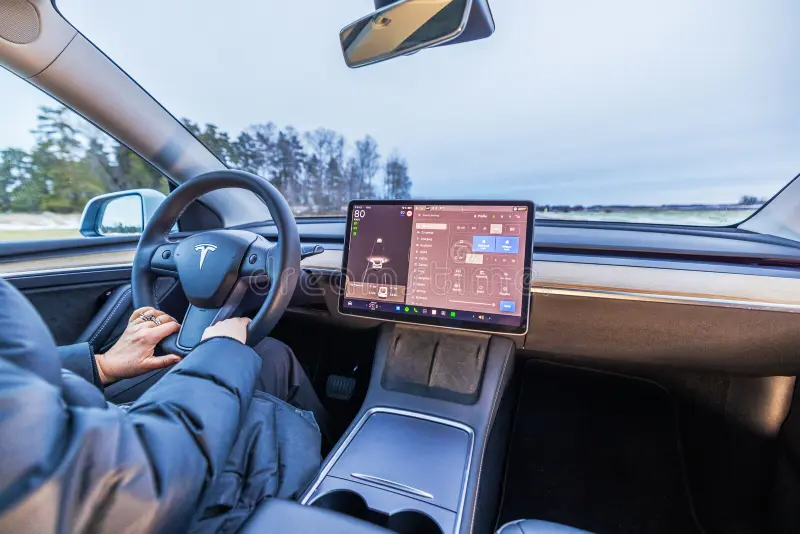In an era where technology is relentlessly reimagining our world, the intersection of AI-powered electric vehicles (EVs) and autonomous driving stands out as a transformative force. Did you know that according to BloombergNEF, the sales of autonomous electric vehicles could reach 10 million units annually by 2030? This surge is driven by advancements in AI, making EVs not just electric but also intelligent. In this article, we’ll explore how AI is revolutionizing the EV landscape, the impact it has on autonomous driving, and what this means for the future of mobility.
The Role of AI in Electric Vehicles
AI Enhancements Fueling the EV Revolution
Artificial Intelligence is fundamentally altering the capabilities of electric vehicles. By 2023, brands like Tesla and Rivian have integrated AI to optimize battery management, resulting in increased efficiency and range. AI algorithms predict the most efficient routes, manage energy consumption, and even anticipate maintenance needs, ensuring that electric cars are smarter than ever.
- Battery Optimization: AI systems monitor and adjust battery usage in real-time, extending the lifespan and performance of lithium-ion batteries. Companies like Tesla employ AI to enhance their battery management systems, allowing vehicles to travel further on a single charge.
- Predictive Maintenance: AI predicts potential mechanical failures before they occur, reducing downtime and improving safety. According to InsideEVs, this proactive approach can decrease maintenance costs by up to 20%.
- Enhanced User Experience: AI personalizes driver preferences, adjusting seating, climate control, and infotainment systems automatically.
AI and Autonomous Driving: A Perfect Match
AI is the backbone of autonomous driving technology, allowing vehicles to navigate complex environments without human intervention. Brands like Hyundai and Nissan are at the forefront, leveraging AI to power their autonomous systems.
- Object Detection and Avoidance: AI-driven sensors and cameras enable vehicles to detect obstacles and other road users, ensuring safe navigation. This technology is critical for the development of Level 4 and Level 5 autonomous vehicles.
- Real-Time Data Processing: Autonomous EVs process vast amounts of data in real-time to make split-second decisions. The fusion of AI with advanced computing platforms allows for precise control and decision-making.
- Adaptive Learning: AI continuously learns from its environment, improving its decision-making algorithms over time. This capability is crucial for adapting to new driving conditions and regulations.
The Impact on Global Mobility Trends
Redefining Urban Transportation
AI-powered EVs are set to redefine urban transportation systems. Cities worldwide are investing in smart infrastructure to accommodate autonomous vehicles, reducing traffic congestion and pollution.
- Shared Mobility Solutions: Companies like Volkswagen and Ford EV are exploring AI-driven ride-sharing platforms that offer flexible, on-demand transportation. This shift towards shared mobility can significantly reduce the number of vehicles on the road.
- Traffic Management: AI enhances traffic flow by predicting congestion patterns and optimizing routes. A study by MIT Technology Review highlights that AI-driven traffic management systems can cut travel times by up to 25%.
Environmental Benefits
The combination of AI and EV technology is a powerful tool for combating climate change. By reducing emissions and enhancing energy efficiency, AI-powered EVs contribute to a greener planet.
- Lower Emissions: Autonomous EVs operate more efficiently than traditional vehicles, leading to lower greenhouse gas emissions. According to the International Energy Agency, widespread adoption of autonomous EVs could reduce global CO2 emissions by over 500 million tons annually by 2030.
- Renewable Integration: AI optimizes the integration of renewable energy sources into charging infrastructure, ensuring that EVs are powered by clean energy.
Practical Tips for Embracing AI-Powered EVs
How to Choose the Right AI-Enabled EV
When selecting an AI-powered EV, consider the following factors to ensure you find the best fit for your needs:
- Autonomy Level: Determine the level of autonomous capability you desire. Levels range from 0 (no automation) to 5 (full automation).
- Battery Range: Evaluate the vehicle’s battery range and charging options. Brands like Lucid Motors are pushing the limits with ranges exceeding 500 miles.
- AI Features: Assess the AI features available, such as adaptive cruise control, lane-keeping assistance, and self-parking capabilities.
Where to Buy AI-Powered EVs
Leading brands offer a variety of AI-enabled EV models. Here are some top picks:
- Tesla Model S: Known for its cutting-edge AI technology and impressive range.
- Rivian R1T: Offers robust AI capabilities and off-road versatility.
- Nissan Leaf: A popular choice for urban commuters seeking AI-powered efficiency.
Conclusion: The Road Ahead
As we look towards the future, the convergence of AI and electric vehicles promises to revolutionize the way we travel. AI-powered EVs are not only making driving safer and more efficient but also paving the way for a sustainable and autonomous future. As we embrace this exciting evolution, the question remains: are we ready to hand over the wheel to AI and embark on this new journey?
To stay ahead in this rapidly changing landscape, keep an eye on emerging technologies and consider how they can enhance your mobility experience. The future of transportation is bright, and AI-powered EVs are leading the charge toward a smarter, greener world.

